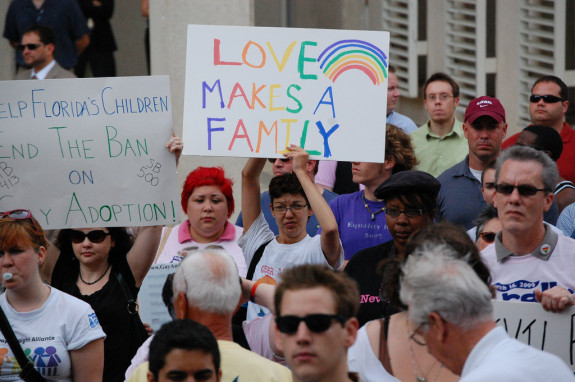By Ashley Lopez
Florida Center for Investigative Reporting
A coalition of gay couples in Florida is taking on the state’s ban on gay marriage.
Florida is just one of many states where residents are taking on state-level gay marriage bans in the wake of the U.S. Supreme Court striking down part of the 1993 Defense of Marriage Act (DOMA), which banned gay marriage on a federal level.
This week in Miami, six couples announced they are suing Miami-Dade County for the right to marry. The lawsuit represents a direct challenge to Florida’s 2008 ban on gay marriage that was enshrined in Florida’s Constitution by 62 percent of voters.
Florida’s constitutional ban on gay marriage also does not recognize legal same-sex marriages performed in other states. It also directed the state to not recognize domestic partnerships.
As The Miami Herald reported on Tuesday, “the 12 plaintiffs are represented by the law firm Carlton Fields Jorden Burt, attorney Elizabeth F. Schwartz, attorney Mary B. Meeks and the National Center for Lesbian Rights (NCLR).”
According to the 21-page filing, which names Miami-Dade County Clerk Harvey Ruvin as defendant, the plaintiffs “allege that Florida’s categorical exclusion of all same-sex couples from marriage deny same-sex couples, including the plaintiff couples, and their families the fundamental rights, dignity, and equality guaranteed to all persons by the United States Constitution.”
…Schwartz, a Miami Beach family attorney and estate planner, said she expects the Florida lawsuit to take years to wind its way through the court system.
“The county has 30 days to respond to us. They could file a motion to dismiss, but we expect they’ll answer the complaint. And we’re off to the races,” she said. “It’s a lawsuit like any other, potentially with evidence and hearings and we hope that the judge will rule favorably. We expect that whoever loses will probably appeal.”
[Shannon Minter, the legal director of the NCLR, said he] has long-time experience in Florida, where NCLR helped fight the state’s 33-year ban against gays adopting, which ended in 2010.
“Florida has often been on the cutting edge for civil rights issues and protections for the south, culturally and politically. An influential state,” he said. “What happens in Florida really matters, not only for the folks here, but across the whole country.”
More than 1,000 couples volunteered to be part of the lawsuit. Six were chosen.
“We wanted folks who could just be representative of the community and who were in different life situations. One of our couples is dealing with aging issues. We wanted to show couples raising children. One of our couples has grandchildren. They work in all different fields. They’re culturally diverse,” Minter said.
While the Supreme Court directed the federal government to recognize same-sex marriages, the high court did not settle language in DOMA that allows states to not recognize marriages performed in other states or countries.
This has made legal fights for gay marriage in other states– especially in red states– complicated.
While federal courts overturned gay-marriage bans in red states like Oklahoma and Utah, conservative state leaders in both states are fighting back and plan to propose bills in their respective state houses that target the gay community.
According to a recent story from The Associated Press, the movement for gay marriage rights in states across the country now “faces its greatest test as foes complain that the recent decisions have leapt ahead of the public in those deeply red states and risk creating another Roe v Wade, where courts settle a divisive social issue but sow the seeds for prolonged conflict.”
Shortly before the court announced its decision, Justice Ruth Bader Ginsburg raised eyebrows by giving a speech that criticized Roe v Wade for stopping what could have been a more effective state-by-state push to legalize abortion. When the ruling came on Proposition 8 and a related challenge to the Defense of Marriage Act, the court pointedly did not legalize gay marriage nationwide. But its finding that the Defense of Marriage Act violated the 14th Amendment sparked the flurry of litigation that led to the December ruling in Utah and last week’s in Oklahoma City. Both of those decisions are being appealed to the 10th Circuit in Denver.
Gay marriage bans have also been struck down by courts in New Jersey and New Mexico, and a spate of new laws have passed in other states. In the seven months since the Supreme Court’s landmark decision, the number of states allowing gay marriage has jumped from 12 to 17 with Utah and Oklahoma in limbo pending decisions by appeals courts. Gay marriage supporters argue the time is ripe for the lifting of bans nationwide by the Supreme Court.
John Eastman of the National Organization for Marriage in Washington, DC, which opposes same-sex marriage, said that the recent rulings courts disaster. “If they don’t let it be fought out in the states, there is going to be an eruption,” Eastman said.
But Scott J. Hamilton, executive director of the Cimarron Alliance Equality Center, said a backlash is worth it. “It will go away eventually,” he said. “I’m frankly not worried about equality coming through the courts….If we relied on popular opinion in Oklahoma to grant marriage equality it probably wouldn’t happen for generations.”
Even though Florida voted for a Democrat twice in the last two presidential elections, the state is still led by conservative Republicans, which could make political state-level backlash a possibility if the state’s gay marriage ban is overturned.
This year, Florida’s Republican governor Rick Scott, who supports the state’s current ban, is running for re-election. Charlie Crist is running as a Democrat for his former job. As Florida’s Republican governor in 2008 Crist supported the state’s amendment banning gay marriage. Now, however, Crist has said he approves throwing out the ban. Crist will run against Nan Rich in the Democratic primary. Rich released a statement stating that Gov. Scott should “let this law die.”

